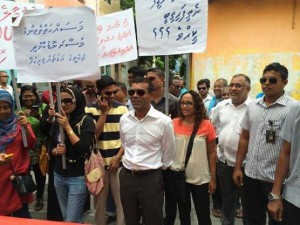The breakup of the Progressive Coalition will not affect the work of the government, insists Vice President Dr Mohamed Jameel Ahmed following Jumhooree Party’s (JP) exit from the group.
Jameel’s comments to local media come as the President’s Office confirmed Transport Minister Ameen Ibrahim and two of his junior ministers – all JP members – had been asked to ‘stay at home’.
After coalition partner Gasim Ibrahim chose to stand – albeit unsuccessfully – for the Majlis speaker’s position yesterday, the Progressive Party of Maldives (PPM) released a statement officially ending the coalition agreement.
“In accordance with the unanimous decision of the PPM council at an emergency meeting on the night of May 26, 2014, we announce that the coalition agreement made between this party and the Jumhooree Party has been brought to an end by the Jumhooree Party as of today,” read the statement.
The party had previously threatened to dissolve the pact should JP leader Gasim stand in competition for the post.
Additionally, in response to Gasim’s complaints that the PPM had breached the coalition agreement by not providing his party with only 29 of the 40-90 promised appointments, President Abdulla Yameen claimed many of its nominees had been unqualified.
Tourism Minister and head of the cabinet’s economic council Ahmed Adeeb earlier this week expressed his intention to ask Yameen to replace JP’s political appointees in the event of a split.
The two junior ministers suspended today have been named by local media as State Minister for Transport Ahmed Zubair and Deputy Minister of Transport Ikram Hassan.
President’s Office spokesman Ibrahim Muaz told local media that the suspensions were in relation to the coalition split, and will remain in place until the matter is resolved.
Balance of power
While the PPM’s Abdulla Maseeh won the vote at the opening of yesterday’s 18th People’s Majlis, the narrow victory appeared to suggest the impact the split will have on the government.
“Gasim holds the balance of power – I think this will destabilise the government seriously,” said opposition Maldivian Democratic Party Spokesman Hamid Abdul Ghafoor today. “We suspect it won’t last for five years.”
Hamid pointed to his party’s experience of governance, following its own short-lived coalition with Gasim’ JP in 2008. After concerted anti-government pressure and months of street demonstrations, the MDP government fell in early 2012.
The PPM currently controls 44 percent of the Majlis – 37 seats – while the opposition MDP hold 29 percent – 25 seats. The JP controls 18 percent of the house – 15 seats, with the Adhaalath’s sole representative and two independents making up the 85-seat legislature.
PPM MP Maseeh received 43 votes to secure the speaker’s chair yesterday, with Gasim receiving the support of 39 members.
The fine balance left in the wake of the coalition split was also evident in the election of MDP MP ‘Reeko’ Moosa Manik – who took the deputy speaker’s position with 42 votes to his PPM opponent’s 41.
In yesterday evening’s statement, the PPM cited the JP’s co-operation with the MDP in Moosa’s election as further cause for the coalition split – depicting the dissolution of the agreement as the JP’s decision.
Speaking with local media, Vice President Jameel said that the JP was going against the citizen’s wishes by working with MDP – who last month endorsed Gasim’s candidacy for speaker.
Jameel today argued that unity against the MDP had been the basis of the coalition.
The parties entered a formal coalition agreement ahead of last year’s presidential election run-off between the MDP’s Mohamed Nasheed and PPM’s Yameen after Gasim has placed third.
Gasim’s endorsement of Yameen proved to be crucial in the PPM-led coalition’s narrow victory in the second round of November’s presidential polls.
“From JP leader Gasim to everyone in all levels, were working against the MDP’s actions. For example, the GMR issue and the detention of Judge Abdulla. Are they now saying all of that is fine? I am saying this because [Gasim] has spoken of how it is easy for the two of them [Gasim and Nasheed] to work together,” said Jameel.
“It is the citizens who suffer the most when JP acts against the spirit and aim of the coalition. It is now questionable if JP can work with any party in a coalition,” said Jameel, before telling local media to expect further developments in the coming week.
